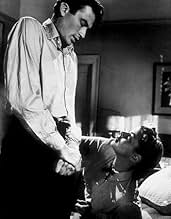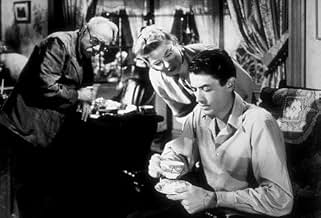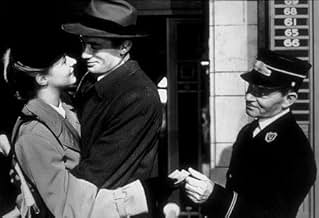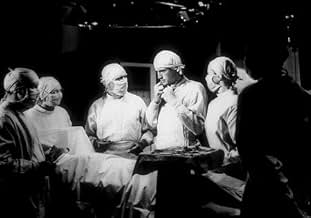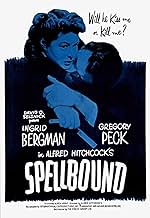अपनी भाषा में प्लॉट जोड़ेंA psychiatrist protects the identity of an amnesia patient accused of murder while attempting to recover his memory.A psychiatrist protects the identity of an amnesia patient accused of murder while attempting to recover his memory.A psychiatrist protects the identity of an amnesia patient accused of murder while attempting to recover his memory.
- 1 ऑस्कर जीते
- 8 जीत और कुल 7 नामांकन
Jean Acker
- Matron
- (बिना क्रेडिट के)
Irving Bacon
- Railway Gateman
- (बिना क्रेडिट के)
Richard Bartell
- Ticket Taker
- (बिना क्रेडिट के)
Harry Brown
- Gateman
- (बिना क्रेडिट के)
सारांश
Reviewers say 'Spellbound' is a captivating blend of romance, mystery, and psychological intrigue, showcasing Alfred Hitchcock's signature style. The innovative dream sequences by Salvador Dali are praised for their surreal dimension. Ingrid Bergman and Gregory Peck deliver acclaimed performances, with Bergman as a dedicated psychoanalyst and Peck as an amnesiac suspect. The suspenseful plot, involving a murder mystery and mind exploration, is noted for its twists. However, some find the pacing slow and dialogue melodramatic. The haunting musical score by Miklós Rózsa is celebrated. Despite mixed opinions, 'Spellbound' is regarded as a noteworthy Hitchcock film.
फ़ीचर्ड समीक्षाएं
I watched Spellbound for the first time this morning, and overall I was very impressed. While Spellbound is far from his best film, it is in general very well done, and I would definitely watch it again for a number of reasons. Hitchcock's direction is noteworthy, maybe not as tight as it usually is, but still noteworthy. The film is shot with breathtaking black and white cinematography, particularly the scene in the countryside, in fact the only scene where it didn't quite work was in the skiing scene, it looked rushed and a tad too amateurish. On a more positive note, the music score by Miklos Rosza was absolutely outstanding; it is without a doubt one of the best film scores I have ever heard, and in my opinion one of the more memorable scores in any Hitchcock film. From the beautiful sweeping title theme, to some truly haunting parts in especially the scene with the sleepwalking. The final solution is exceedingly clever and unpredictable, and the dream sequence by Salvador Dali while short was essential to the plot and very effective. Speaking of the plot, mixed with psychological nuances and a young doctor's struggles to help her patient/ lover and prove his innocence, has its usual twists and turns and is pretty suspenseful. I will admit some of it is implausible, and the script may just lack the sophistication of the scripts of Hitchcocks like Vertigo or Rebecca, but on the whole it was cleverly crafted. The performances are in general very good; Gregory Peck is disappointingly one-note, but as the beautiful but cold Constance Peterson Sweedish beauty Ingrid Bergman is a revelation. The standout supporting turns come from Michael Chekov as Alex and Leo G. Carroll as Murchison, both add a lot to the film and do very well, and Hitchcock himself makes a cameo. All in all, has its flaws, and is definitely not Hitchcock's best, but I do recommend it. And I do think that along with StageFright it is one of the more undervalued Hitchcock movies. 8/10 Bethany Cox
Good Alfred Hitchcock film in which Ingrid Bergman plays a psychiatrist from a mental hospital with various patients (Norman Lloyd, Rhonda Fleming), along with Leo G. Carroll and other doctors heal them . There comes Gregory Peck replacing former director . But Peck has amnesia and having panic to white color and the lines , then Ingrid falls in love with him , as she uncovers his previous life through Freudian analysis . The picture is based on novel ¨House of Edwards¨ by Bleeding and concerning the psychoanalysis , an usual theme in post-WWII time.
The movie contains thriller , tension , suspense , romance , intrigue , unlimited excitement and plenty of plot twists , as usual in Hitchcock films . Besides , it has a literately witty dialog with distinctive Hitch's touches and writing credits by Ben Hetch (Billy Wilder's habitual writer). There's also an exciting and famous dream sequence by Salvador Dali . Hitch didn't want the ordinary dream images with fog and cloud but he asked David O'Selznick (the famed Hollywood producer) for hire to prestigious surrealist painter Salvador Dali from Spain . Superb performances from main characters , a gorgeous blonde (Hitch later used Grace Kelly , Kim Novak) Ingrid Bergman (1915-1982) who would work with Hitchcock in various films (Notorious , Under Capricorn) and the elegant and brilliant Gregory Peck (Paradine trial) as the confuse amnesic , both of whom are frankly well . They are well accompanied by a good support cast , such as : Leo G Carroll, Rhonda Fleming and Norman Lloyd , Hitch' s regular. Sensational black and white cinematography by George Barnes . Dramatic, atmospheric and thrilling musical score by Miklos Rozsa , he won an Academy Award for the excellent score . The flick will appeal to Hitchcock enthusiasts as well as Ingrid Bergman/Gregory Peck fans . Rating : Above average , well worth watching.
The movie contains thriller , tension , suspense , romance , intrigue , unlimited excitement and plenty of plot twists , as usual in Hitchcock films . Besides , it has a literately witty dialog with distinctive Hitch's touches and writing credits by Ben Hetch (Billy Wilder's habitual writer). There's also an exciting and famous dream sequence by Salvador Dali . Hitch didn't want the ordinary dream images with fog and cloud but he asked David O'Selznick (the famed Hollywood producer) for hire to prestigious surrealist painter Salvador Dali from Spain . Superb performances from main characters , a gorgeous blonde (Hitch later used Grace Kelly , Kim Novak) Ingrid Bergman (1915-1982) who would work with Hitchcock in various films (Notorious , Under Capricorn) and the elegant and brilliant Gregory Peck (Paradine trial) as the confuse amnesic , both of whom are frankly well . They are well accompanied by a good support cast , such as : Leo G Carroll, Rhonda Fleming and Norman Lloyd , Hitch' s regular. Sensational black and white cinematography by George Barnes . Dramatic, atmospheric and thrilling musical score by Miklos Rozsa , he won an Academy Award for the excellent score . The flick will appeal to Hitchcock enthusiasts as well as Ingrid Bergman/Gregory Peck fans . Rating : Above average , well worth watching.
Alfred Hitchcock makes his customary quick cameo at 38:52-38:55 at the Empire Hotel lobby in New York City. He's exiting an elevator, smoking a cigarette.
"Spellbound" has become one of my favorite Hitchcock movies. I think Gregory Peck is excellent in this movie as John Ballantine, the amnesiac who receives help from Dr. Constance Peterson (Ingrid Bergman). But John has more problems than amnesia. He cannot stand to see dark lines on a white background. For example, a blanket, a robe, and a tablecloth. But he remembers what had happened to him thanks to Constance and her former teacher, another psychologist named Dr. Brulov.
There is also a wonderful performance by Leo G. Carroll, who plays Dr. Murchison. He has also been one of my favorite actors, and he's brilliant in this movie.
So the bottom line is, you should really see this movie, and not just for Gregory Peck's handsome face, or Ingrid Bergman's beauty. I think it's one of Hitch's best suspense movies. By the way, Gregory Peck does look very, very handsome in this movie, so for those girls out there who still think you might not want to see it, it's worth it!
There is also a wonderful performance by Leo G. Carroll, who plays Dr. Murchison. He has also been one of my favorite actors, and he's brilliant in this movie.
So the bottom line is, you should really see this movie, and not just for Gregory Peck's handsome face, or Ingrid Bergman's beauty. I think it's one of Hitch's best suspense movies. By the way, Gregory Peck does look very, very handsome in this movie, so for those girls out there who still think you might not want to see it, it's worth it!
I recently saw this film on the large screen after having not seen it for over 10 years. My memories of it were not that fond -- I recalled it as an unusually melodramatic and not very convincing thriller enlivened by a very attractive cast.
What I had forgotten about was how almost impossibly silly all the psychoanalytical claptrap is, especially in the first couple of reels, which thereby make us feel very quickly that we're not quite in the mature, masterful grip of Hitch's usual wit and taste. Yes, I know this was made in the 40's, but the first 20 to 30 minutes of the film have more sexist moments and infantile behavior by supposed doctors than one would ever expect from either Hitch or Ben Hecht.
So who's to blame? One guess -- David O. Selznick! That being said (along with the fact that the story doesn't really add up to much of anything, since all the premises on which it's based seem so shaky, naive and downright goofy), the film has some things going for it. About midway through the picture, when Michael Chekhov appears as Dr. Brulov, the film suddenly kicks into what we might call "classic British Hitch mode," with the kind of understated wit and ensemble playing the director had been doing so well since the early 30's. It almost becomes another (and far more palatable) film at this point. The scenes with Bergman, Peck and Chekhov are the highlight of the film, and I have to admit that I'm even kind of fond of the hotel lobby scene, with the appealingly breezy Bill Goodwin (of "Burns and Allen" radio fame) as the house detective. Peck has never been more handsome, in a strangely fragile way.
Also worth a look are the brief but truly unusual Dali-designed dream sequences. There is something to be said for Miklos Rozsa's score as well: although it edges a bit far into soupy overscoring, the expressive main theme has quality, and his use of the theremin (which he also employed in his score for THE LOST WEEKEND at virtually the same time) is striking and represented "something new" in film music.
One could easily make excuses for this film based on "it was only 1945" or "what people knew about psychoanalysis was still naive", etc., but even taken in context of its time it's a pretty silly film without the kind of sustained surety of style leavened with simultaneous suspense, intelligence, taste and humor that he had already proved he could do so well from more than ten years earlier. Given a standard he had already given us with examples from THE 39 STEPS or YOUNG AND INNOCENT through THE LADY VANISHES in the UK, or FOREIGN CORRESPONDENT and SHADOW OF A DOUBT here in the US, this film seems not up to his true capacities, and like his other Selznick-produced American film, REBECCA, seems both overfussy and filled with emphases and spoonfeeding of details which Hitch himself would never have given us.
You need only compare this film with his very next one, NOTORIOUS, to be painfully aware how much better Hitchcock on his own -- using his own standards of pace, momentum and the ADULT treatment of script themes -- could be when not under the thumb of Selznick. Thank God he didn't have to work for him any more after this.
What I had forgotten about was how almost impossibly silly all the psychoanalytical claptrap is, especially in the first couple of reels, which thereby make us feel very quickly that we're not quite in the mature, masterful grip of Hitch's usual wit and taste. Yes, I know this was made in the 40's, but the first 20 to 30 minutes of the film have more sexist moments and infantile behavior by supposed doctors than one would ever expect from either Hitch or Ben Hecht.
So who's to blame? One guess -- David O. Selznick! That being said (along with the fact that the story doesn't really add up to much of anything, since all the premises on which it's based seem so shaky, naive and downright goofy), the film has some things going for it. About midway through the picture, when Michael Chekhov appears as Dr. Brulov, the film suddenly kicks into what we might call "classic British Hitch mode," with the kind of understated wit and ensemble playing the director had been doing so well since the early 30's. It almost becomes another (and far more palatable) film at this point. The scenes with Bergman, Peck and Chekhov are the highlight of the film, and I have to admit that I'm even kind of fond of the hotel lobby scene, with the appealingly breezy Bill Goodwin (of "Burns and Allen" radio fame) as the house detective. Peck has never been more handsome, in a strangely fragile way.
Also worth a look are the brief but truly unusual Dali-designed dream sequences. There is something to be said for Miklos Rozsa's score as well: although it edges a bit far into soupy overscoring, the expressive main theme has quality, and his use of the theremin (which he also employed in his score for THE LOST WEEKEND at virtually the same time) is striking and represented "something new" in film music.
One could easily make excuses for this film based on "it was only 1945" or "what people knew about psychoanalysis was still naive", etc., but even taken in context of its time it's a pretty silly film without the kind of sustained surety of style leavened with simultaneous suspense, intelligence, taste and humor that he had already proved he could do so well from more than ten years earlier. Given a standard he had already given us with examples from THE 39 STEPS or YOUNG AND INNOCENT through THE LADY VANISHES in the UK, or FOREIGN CORRESPONDENT and SHADOW OF A DOUBT here in the US, this film seems not up to his true capacities, and like his other Selznick-produced American film, REBECCA, seems both overfussy and filled with emphases and spoonfeeding of details which Hitch himself would never have given us.
You need only compare this film with his very next one, NOTORIOUS, to be painfully aware how much better Hitchcock on his own -- using his own standards of pace, momentum and the ADULT treatment of script themes -- could be when not under the thumb of Selznick. Thank God he didn't have to work for him any more after this.
क्या आपको पता है
- ट्रिवियाSir Alfred Hitchcock was disappointed with the limits of Gregory Peck's facial expressions. According to Peck, "I couldn't produce the facial expressions that Hitch wanted turned on. I didn't have that facility. He already had a preconception of what the expression ought to be on your face, he planned that as carefully as the camera angles. Hitchcock was an outside fellow, and I had the Stanislavski training from the Neighborhood Playhouse, which means you work from the inside."
- गूफ़The burn on J.B.'s hand is only visible when Petersen notices it. It disappears in every other scene where his hand is visible (like when he is sitting on the couch with Dr. Brulov).
- भाव
Dr. Alex Brulov: Women make the best psychoanalysts until they fall in love. After that they make the best patients.
- क्रेज़ी क्रेडिटOpening credits: THE FAULT . . . . . IS NOT IN OUR STARS, BUT IN OURSELVES . . . . . - SHAKESPEARE
Our story deals with psychoanalysis, the method by which modern science treats the emotional problems of the sane.
The analyst seeks only to induce the patient to talk about his hidden problems, to open the locked doors of his mind.
Once the complexes that have been disturbing the patient are uncovered and interpreted, the illness and confusion disappear.....and the devils of unreason are driven from the human soul.
- इसके अलावा अन्य वर्जनThe original theatrical version had an Overture and Exit Music by Miklós Rózsa, to a total running time of 118m09s. It was suppressed from distribution until the 1999 restoration based on the negatives of Selznick library (that came to be owned by Walt Disney Company via ABC-TV) and two DVD editions.
टॉप पसंद
रेटिंग देने के लिए साइन-इन करें और वैयक्तिकृत सुझावों के लिए वॉचलिस्ट करें
- How long is Spellbound?Alexa द्वारा संचालित
- What is 'Spellbound' about?
- Is "Spellbound" based on a book?
- What does the opening caption say?
विवरण
- रिलीज़ की तारीख़
- कंट्री ऑफ़ ओरिजिन
- भाषा
- इस रूप में भी जाना जाता है
- Cuéntame tu vida
- फ़िल्माने की जगहें
- Penn Station, मैनहटन, न्यूयॉर्क शहर, न्यूयॉर्क, संयुक्त राज्य अमेरिका(establishing shot of the first train station)
- उत्पादन कंपनियां
- IMDbPro पर और कंपनी क्रेडिट देखें
बॉक्स ऑफ़िस
- बजट
- $16,96,377(अनुमानित)
- दुनिया भर में सकल
- $19,288
- चलने की अवधि1 घंटा 51 मिनट
- रंग
- पक्ष अनुपात
- 1.37 : 1
इस पेज में योगदान दें
किसी बदलाव का सुझाव दें या अनुपलब्ध कॉन्टेंट जोड़ें



